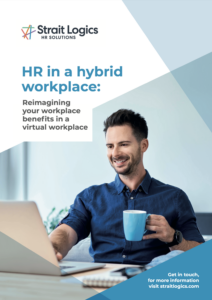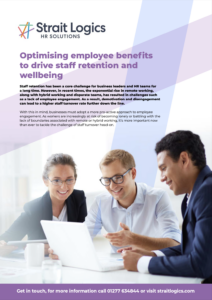
Career Development is on the radar as we celebrate National Career Development Month in November. And, as the rise in remote and hybrid working has meant businesses have seen huge changes to the working routine, HR leaders have had to re-assess their approach to career development in a more virtual working landscape.
According to the Chartered Institute of Personnel & Development (CIPD), 78% of organisations have embraced hybrid working. However, while hybrid models of working come with several benefits for workers such as better flexibility and work-life balance, keeping on top of career development can be tricky when workers are out of sight for much of the time.
As leaders and line managers continue to settle into new working routines, it’s important to keep progression front of mind, so that employees feel a sense of purpose and direction as they balance their time between their homes and the office.
The importance of progression
At a time when the great resignation is still wreaking havoc for employers, businesses must find ways to keep employees engaged, and aligned with your business values. Investing more time in workers’ development plans is crucial if you want to ensure employees feel invested as part of the future of the business.
Listen to their needs
Taking the time to check in with employees regularly and catch up on their career aspirations is important. One common mistake is assuming you know the career path a worker will want or expect. Opening the floor for alternative or tailored roles, or different disciplines and departments, and making sure employees know the options available to them is crucial. No employee is the same, and not everyone will want to progress through the same progression journey as everyone else. Managers and leaders must listen to their team members, take the time to truly understand their needs and desires, and make sure they build a plan to address short-term, and longer-term goals.
Invest in education
It’s also important to communicate the bigger picture, when it comes to the future of each employee, and how you envisage they’ll play their part in the company’s growth. One crucial aspect of this is investing in workers’ development in the form of education and training. Identifying weaknesses or talking to workers about how they might like to upskill, it’s important to push your employees to gain new skills and gain knowledge as they continue to grow in their role. Whether it’s allowing time to study for a degree or diploma, or offering one-day training workshops, allowing employees to enhance their skills will also let them know they are valued, and you’ve invested in their future as part of your business.
Map out an individual plan
Every progression plan or Individual Development Plan (IDP) will depend on the employee in question. You’ll need to make sure that KPIs are agreed upon between you, and the employee, so that you both agree their career development goals are achievable. As with any developmental goal, you’ll need the progression plan to be measurable, attainable within a specific (and clearly outlined) timeframe and aligned with the wider goals of the business. It’s important to take hybrid working into account when building a progression plan and break down any ambitious goals with smaller set benchmarks, regular check-ins and targets along the way. With a clear development plan in place, managers can prepare to support their direct reports, and employees have a clear idea of what they need to do to progress in their career.
Recognise hard work
Burnout has become an increasing challenge for managers who supervise remote workers. In fact, burnout has been cited as the number one reason for employees quitting their jobs. As 79% of employees reported feeling burned out, acknowledging hard work is essential, to ensure workers don’t become disheartened or disengaged in their roles.
Acknowledging workers who go above and beyond, even if their activity isn’t part of the plan, is essential to make sure employees don’t feel their work goes unnoticed. Even if it isn’t a promotion, consider rewarding diligence and commitment with alternative rewards as part of a comprehensive employee benefits scheme.
A well-considered, personalised approach to your workplace benefits strategy can help to keep workers feeling engaged, fulfilled, and focused on their career progression. Strait Logics’ comprehensive HR solutions provide you with the tools you need to personalise and manage your portfolio of chosen benefits to keep your workforce feeling focused on their work-life goals.

